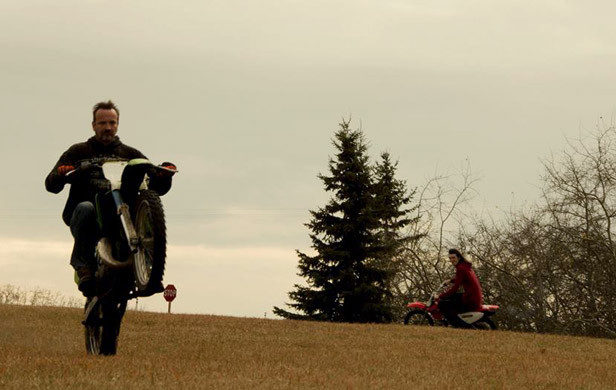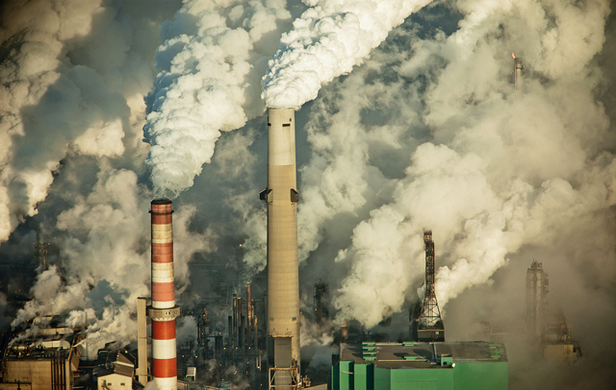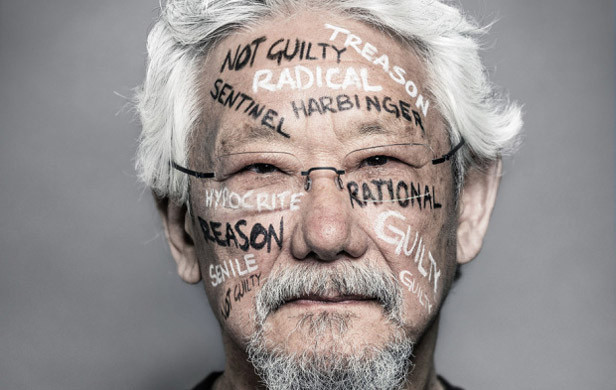
by Matt Sutton
In November, 2013, I drove to Lacombe, Alberta, to visit my Dad and his family, accompanied by my best friend Alex – a chemical engineer technologist at Imperial Oil, responsible for conducting research on how to clean up tailing ponds.
My Dad has worked in Alberta’s oil and gas industry for twenty-two years.
Both Alex and myself have been shaped by this multi-billion dollar industry, Alex working in it and me having grown up in a household financially supported by it.
This reality was reflected in our trip to Lacombe.
[quote]I was aware of northern Alberta and Fort McMurray before I knew what the oil and gas industry was.[/quote]
David ‘Vivuki’ is an idiot
After a day of dirt biking on my father’s acreage, we sat down for dinner and within minutes discussion about the oil sands, Neil Young and David Suzuki joined us at the table.
“David ‘Vivuki’ is an idiot,” stated the eight-year-old at the table.
“It’s Suzuki, sweetie,” corrected her Mother, “but that’s right, he’s an idiot.”
At the time it was hilarious hearing her numerous attempts at saying the name ‘Suzuki’, but as I look back now the meaning of this dinner table discussion scares me.
Growing up in an oil and gas family, I have first-hand experience of the benefits the industry offers. My Dad always had a job, and subsequently, I always had new toys and my family always had a meal for dinner.
But for me – and I suspect many like me – it has also created a lot of confusion about how we should respond to the debate over an economy that has clothed us, but is also controversial in many other ways.
Alberta’s economic promise
My Dad left his home in England at 18 and joined the British Military. He spent the following decade fixing England’s tanks internationally. Then, at some point, he met my Mom, had me and my sister, left the army and settled in Calgary, Alberta.
Being a heavy-duty mechanic, he began work with a drilling company and moved up the ladder of the oil and gas industry. Today, he is a maintenance manager for a coil tubing company which conducts drilling internationally.
As a kid, I didn’t understand the ins and outs of what my Dad did, nor did I really care – similar to the way his fiancé’s eight-year-old daughter doesn’t understand who David Suzuki is – she only understands what she hears.
I knew my Dad worked on drilling rigs up north and that meant he was gone all the time. I remember him being in a place described to me as ‘up north’, or sometimes it was ‘Fort Mac’.
I was aware of northern Alberta and Fort McMurray before I knew what the oil and gas industry was.
Trading family time for toys
But my Dad missed a lot – hockey games, skateboard contests, birthdays and school concerts – and the reasoning for it was always, “Your Dad has to work.”

Looking back now, I still wish he could have been there, but without that work I never could have played hockey, I never would have had skateboards and I would not have gotten Gameboys, CD players, or new skates for my birthday.
Now that I am older and attempting to find my place in the world, having become more aware of the public debate surrounding the oil and gas industry, I face a great deal of confusion.
On one side, I am being shown the horrific damage to the environment caused by these companies taking oil from the ground, the ecosystems they have destroyed and the way they are jeopardizing the future of our planet.
On the other side, I see an industry responsible for my Dad always having work and for my life’s privileges.
Does opposing the oil and gas industry’s actions make me ungrateful?
Does agreeing with the oil and gas industry’s actions make me ignorant?
I am constantly unsure. In Alberta, it feels like I’m not supposed to question what’s going on. I’m supposed to be appreciative of the ways it makes my life and my cities economy better.
Same old corporate oil answers
At some points, I have asked my Dad questions about the oil sands, what he thinks and what it all means to him, but it always seems to be the same corporate oil answers:
[quote]We need oil, there’s not much you can touch in a day that doesn’t come from oil.
How come there’s a big fuss about Alberta but nobody cares about drilling in Saudi Arabia? Is it different because it’s not in Canada?
Yeah there’s pollution but nowhere near as much as they’re emitting in China.[/quote]
These are just some of the answers I’ve received from my Dad in the past, and although these things are true and I appreciate the conversations we have, they do not provide answers. They are all responses that simply divert my attention away from the topic I originally brought up.

Most of the time I feel like I will never find truth. Most who provide an argument on the situation seem to be making money off of it one way or another, and that makes it difficult to discover the truth.
Both sides overreaching
Every time I look into the left side of the conversation I find the same frustrations as I have on the right. Everything seems blown out of proportion with both perspectives.
For example, Neil Young’s private jet and tour buses are enormous consumers of the same fuel his lyrics stand against. I don’t blame him though – if I had the money I’d probably have a private jet too, and I’m not saying that I think the message of his songs are wrong. My problem is I don’t know how I’m supposed to believe his conviction when his actions do not align with his words.
The same kind of things can be said about David Suzuki, another spokesman against the oil sands. Suzuki writes frequently against the oil sands, describing them as ‘scary’ and relating the suits behind the oil companies to the mythical ‘bogeyman’ his children used to ask him about. Suzuki then says, “or maybe there’s something more frightening to consider. Perhaps the bogeyman is us – the public that places short-term economic value of the tar sands above the priceless value of our environment and our earth.”
To be honest, I don’t very much appreciate Mr. Suzuki saying that I, or any other hard working citizen is any kind of bogeyman who values money over the environment. Especially when money is not something he has to worry about.
If being frustrated because another millionaire is making me feel bad for appreciating the money generated from the oil sands wasn’t enough, I found it even harder to listen to David Suzuki’s arguments after hearing the accusations that he made up some information in an opinion piece saying cyclones were an environmental threat to the great barrier reef. When asked about this claim, Suzuki’s response was “that one, I have to admit, was suggested to me by an Australian and it may be true that it might be a mistake, I don’t know.” Is it just me, or does saying that an idea was suggested to him by an Australian make it any less frightening that he wrote it in his article without double checking first?

If David Suzuki had such an easy time putting false information into an article about climate change in Australia, how do I know he’s not doing the same thing here? This is why I have a hard time believing either side of the oil sands argument.
It is examples such as these that frustrate me about the environmental side of the argument. They take things out of context or exaggerate them beyond reason to belittle the oil industry, the same way that the oil industry will downplay issues to make them seem better in the public eye. It is equally frustrating on both sides and makes me feel like neither are being honest.
That said, it is not just the battle between the oil and gas industry and environmentalists that exists this way – nearly every conversation has two different parts from each side that aren’t necessarily honest, and that’s why I got into journalism in the first place, to discover the truth.
I believe the truth is balanced somewhere between the environmentalists comparing the oil sands to Hiroshima and the oil companies calling their reclaimed lands ‘lush’.
My job now, and everybody’s job for that matter, is to listen. Listen to everything said and try understand that although those comments may be exaggerated and both sides may be wrong sometimes, if everybody listens to each other then there is hope for a truth. A truth that I will be willing to accept from both sides.
It is important now more than ever to pay attention to what is going on and listen to everything being said about the oil sands regardless of what you believe and regardless of which side the information is coming from because neither side holds the full truth.
It is going to take a lot of time, patience and cooperation but I do believe the truth is out there to be found.
Matt Sutton is studying journalism at Mount Royal University in Calgary, AB.


Matt, at first your article drew me in; good writing but the content its meaning is as slippery as the oil industry.
Thanks for sharing your journey, Mark. Alberta born, at 70 I too have had learning journey..
I have found it impossible to ignore the irrefutable science about anthropogenic warming—especially the TIME LAG in effects from CO2 which means urgency is upon us!
See Canadian Mark Jaccard and many other scientists who we are headed for 2 degrees from CO2– ALREADY in the pipeline! http://www.vancouversun.com/business/Opinion+world+carbon+doublespeak/8780477/story.html
SCIENCE journalist, David Roberts’ “tweet record” while Sandy worked its devastation puts the implications of the science into a nutshell!
Oct 30/12 David Roberts@drgrist
Realtalk: The oceans will continue to rise for at least 50 years no matter what we do. We can only affect the latter half of century.
There’s nothing Obama (or Bush, Clinton, Bush, or Reagan) could have done to prevent Sandy. Climate don’t work that way.
Big time lags. The mega-hurricanes that we CAN prevent are the ones that will bedevil our children in the latter third of this century.
The best we can do for ourselves and those alive in the next 50 years is enhance the resilience of our communities & infrastructure.
Luckily, distributed renewable energy accomplishes both: reduces carbon emissions & enhances resilience. A two-fer! Let’s do it”
http://grist.org/climate-energy/hawks-vs-scolds-how-reverse-tribalism-affects-climate-communication/
Mar 19/13 Two reasons climate change is not like other environmental problems
http://grist.org/climate-energy/two-reasons-climate-change-is-not-like-other-environmental-problems/
Oct 17/12 David Roberts TEDx Climate Change is Simple http://youtu.be/pznsPkJy2x8
I remember….
Sept 12/13 Peter Lougheed’s Radical Legacy
Behave like an owner, Collect your fair share. Save for a rainy day.
Go slow. Add value. Clean up the mess.
http://thetyee.ca/Opinion/2012/09/17/Radical-Peter-Lougheed/
I wish more policy was based on the Keystone Principle and an understanding that the laws of physics and chemistry do NOT negotiate!
Jan 29/14 The Keystone Principle: Stop Making Climate Disruption Worse
” We don’t need to forswear all fossil fuel use today in order to execute a winning climate strategy. What we do need to forswear –immediately and categorically –is large long-term capital investment in new fossil fuel infrastructure that “lock in” dangerous emission levels.
These are the mistakes we haven’t made yet:new pipelines…and other fossil fuel infrastructure additions that make the problem not just worse but intractable.
They would increase fossil fuel use every year for decades, and it is cumulative emissions that cause climate disruption.” http://grist.org/climate-energy/the-keystone-principle/
Oct 3/13 Ocean acidification due to carbon emissions is at highest for 300m years
http://www.theguardian.com/environment/2013/oct/03/ocean-acidification-carbon-dioxide-emissions-levels
May 1/13 The economics of enough
http://www.guardian.co.uk/business/economics-blog/2013/may/01/economics-of-enough
The tragedy is that we have “proven solutions” which are being almost totally ignored by the present government. For example, feed-in tariffs took Germany to 60% renewables last June. UK implemented feed-in tariffs in 2010 with results below:
Jan 14/14 Half a Million Solar Systems Now on UK Buildings – goal of 1 million panels by 2015
http://ecowatch.com/2014/01/14/half-million-solar-panels-uk-buildings/
Aug 16/13 Separating Fact from Fiction In Accounts of Germany’s Renewables Revolution
http://blog.rmi.org/separating_fact_from_fiction_in_accounts_of_germanys_renewables_revolution
Aug 22/13 Germany Breaks Its Own Record For Solar Power Generation
http://thinkprogress.org/climate/2013/08/22/2508191/germany-solar-generation-record/
I don’t know if you have read the many scientific and non-partisan reports by Pembina– the YEARS of research and comment from our impeccable scientists– David Schindler and William Rees? What do you think of their input?
Nov 27/13 What stands in the way of responsible oilsands development?
http://www.pembina.org/op-ed/2498
March 2013- Dr. William Rees—Founder of Eco-footprint Resources, the 7 Billion, and You: Lecture at Simon Fraser University http://www.youtube.com/watch?v=Y9oDn1_zt6A
Do you know Wen Stephenson in U.S.A. and Cameron Fenton in BC — leaders in Powershift—an international, informed and practical movement of mostly younger generations? A link to Wen’s Feb 17/14 essay in The Nation: http://www.commondreams.org/view/2014/02/07-5
If loving our children has any meaning, it IS a matter of social and political WILL to at least try for rapid transition to 21st century energy.
I long for a day when we are singing “Solartopia” in our legislatures! http://www.youtube.com/watch?v=BeXCKt1VpL8
We’re all together, Mark—in this massive challenge. We have only ONE life support–habitable earth. Hope you’ll continue to share your learning curve. Below a smattering from mine!
Solutions and proven models abound!
http://m.thetyee.ca/Opinion/2014/01/15/If-Every-Norwegians-a-Millionaire-Whys-Alberta-in-Hock/
Jan 15/14 If Every Norwegian’s a Millionaire, Why’s Alberta in Hock?
Feb 26/14 Any country can reach high shares of wind, solar power cost-effectively, study shows
http://www.iea.org/newsroomandevents/pressreleases/2014/february/name,47513,en.html
Mar 3/14 Tim Cook is right: Why profits-first policies are bad for the planet (and business)
http://www.treehugger.com/corporate-responsibility/tim-cook-right-why-profits-first-policies-are-bad-planet-and-business.html
Jan 30/14 Cleantech doesn’t get the ‘respect that it deserves’: Mayor Robertson
http://thetyee.ca/Blogs/TheHook/2014/01/30/cleantech-respect-robertson/
Aug 16/13 Separating Fact from Fiction In Accounts of Germany’s Renewables Revolution
http://blog.rmi.org/separating_fact_from_fiction_in_accounts_of_germanys_renewables_revolution
Aug 22/13 Germany Breaks Its Own Record For Solar Power Generation
http://thinkprogress.org/climate/2013/08/22/2508191/germany-solar-generation-record/
Nov 7/13 Germany finances major push into home battery storage for solar
http://reneweconomy.com.au/2013/germany-finances-major-push-into-home-battery-storage-for-solar-58041
Nov 29/13 Germany shows a thriving green economy is possible
https://commonsensecanadian.ca/germany-shows-thriving-green-economy-possible/
Pricing Carbon—another must if done properly
Mar 12/14 What Has BC’s Carbon Tax Shift Done?
http://thetyee.ca/Opinion/2014/03/12/BCs-Carbon-Tax-Shift/
Mar 4/14 Surprise! Even A Crazy-High Carbon Tax Would Help California Businesses
http://thinkprogress.org/climate/2014/03/04/3356461/california-carbon-tax-200-ton/
April 2011 EU Emissions Trading System: failing at the third attempt
http://www.carbontradewatch.org/downloads/publications/ETS_briefing_april2011.pdf
Nov. 2009 Carbon Trading—How it works and why it fails
http://www.carbontradewatch.org/publications/carbon-trading-how-it-works-and-why-it-fails.html
More on other countries:
Feb 19/14 From one old fossil to another – what Abbott can learn from Saudis
http://reneweconomy.com.au/2014/abbott-saudis-70122
Feb 19/14 Groundbreaking analysis shows China’s renewable energy future within reach
http://wwf.panda.org/?216412/China-renewables-report
2011 Brazilian Wind Power achieves Grid Parity
http://www.cleantechinvestor.com/portal/wind-energy/9838-brazilian-wind-power-achieves-grid-parity.html
REALITIES that must be addressed:
Oct 22/13 Subsidies for fossil fuels make competition from renewables a rigged game
http://www.treehugger.com/energy-policy/giving-renewables-fighting-chance-requires-reforming-fossil-fuel-subsidies.html
Mar 4/14 Study draws attention to tailings seepage in the oilsands
http://www.pembina.org/blog/783
Oct 10.13 Are Alberta’s Tar Sands prepared for a torrential rain event?
http://www.sierraclub.ca/en/AbruptClimateChange
Feb 26/14 Alberta doctor tells U.S.: Canada is ‘lying’ about tar sands’ health effects
http://www.vancouverobserver.com/news/alberta-doctor-tells-us-canada
A journalism student refers to a statement that cyclones present environmental threats to the great barrier reef as ” false information”. Good grief. Does this indicate an aversion to reading? This is not a shocking or outrageous claim, as decades of evidence shows.
Ah, yes, and to find the individuals who have developed the “add on” machinery to create the cleanup from the tar sands “alongside” – and they are shoved to the bottom of the heap because “it is too expensive”.
Also, you’d think a 22 year old oil veteran would be able to afford a helmet for himself and his family…I guess the money isn’t that good after all.
Yes, listening is good. It’s an important part in having a dialogue. However, the facts are out there. Anyone looking for the “truth” need only ask, read, or look..and not very hard, cause it’s there. The time is not JUST for listening. The time is for people to educate themselves, and others, and just importantly, it’s time for action. I fully support making an intelligent, informed, and balanced decision, but I think Canadian’s should be a little more ambitious than to just listen and hope.
David Suzuki is human. He makes mistakes, perhaps less than the oil and gas sector?
Another good convo for you and the old man at the table is how Alberta, despite the endless supply of black gold, is in debt almost $8 billion, and is expected to increase to $17 billion in the next couple of years. Strange eh? Perhaps you could bring up royalties (or the lack thereof) into the conversation. If Albertan’s new how much they were getting screwed financially by oil and gas, I think their relationship might change a bit. Too bad the premier wasn’t Norwegian, then Albertan’s would probably be the richest people on planet Earth.
Hmmm. Interesting comments, too bad you’re so naive. Or stupid. He’s saying there are two sides to the situation, but you’re too caught up in your idealism to read and understand. You must originally be from a “have-not” province. Go back there (or stay there) and whine about the environment and the economy while the oil sands money provides your life’s necessities. Perhaps you think we should all live in caves and grow vegetables, but pulling out the veggies might hurt the dirt. Oh dear, what will you do? You’re an idiot and you should just go away.
Your comment is grossly unfair and is a person attack. Moderation?
Solutions will not come if we can’t work together. The whole ‘have’ and ‘have-not’ game is a distraction intended to divide Canadians. If we’re all focused on our narrow areas, we can do unimaginable things.
Laureen, thank you for your comment. Your sarcasm and hatefulness was both entertaining and sad. Also, thank you for explaining the author’s intent to me, I was truly confused (hey, there’s some more sarcasm there for ya!)!
But, more seriously, apparently you have failed to do what you accused me of doing…read. My point, in the first part of my comment, was that the truth is already known and that we need to, collectively, take action…not sit around and “listen and hope”.
In my opinion, I think your accusation that I am naive would have been more fitting of an accusation for the author, or perhaps yourself. Naive may be a bit nice though, uninformed and bias might better be applied.
For your information, I am Albertan, and proud of it. I’m one of many progressively thinking Albertans, a breed that is on the rise…which I’m sure frightens you to death (but don’t worry, we progressives advocate tolerance, and not blind and ignorant hatred).
Finally, I do enjoy spelunking, but most certainly don’t advise people to live in caves. However, I fully and highly encourage everyone to grow a vegetable garden…an activity shared amongst both progressives and rednecks.
P.S. – I wont go away.
Thank you Matt for reminding us of the importance to listen. I would add – listen beyond the need to reply, listen to understand.
I have recently listened to hydrogeologist, Dr. Gilles Wendling, presenting at the Keepers of the Water … http://www.youtube.com/watch?v=87LuGNoTp-Q … and am reminded that water is the common denominator and rreaching balance means not only looking at the window of opportunity but also reflecting in the mirror of consequences!
I suggest listening to the people who know what they’re talking about—the climate scientists. The Intergovernmental Panel on Climate Change is a good start.
The appeal to hypocrisy argument is fallacious. Whether or not someone uses plastics or fiat currency or ICE vehicles or computers bears no relevance or relationship to the validity or factual-ness of the claims: The continued use of carbon-dense energy is damaging the environment … climate change … to the point of threatening life on the planet.
Posting a laundry list of so-called hypocritical behaviours is meaningless.
It’s OK for folks, whose world view says we need to be free to mine the tarsands to keep the economy and profits growing, and to claim tarsands opponents are hypocritical but it’s not OK for opponents to defend their world view and claim the tarsands will ultimately destroy all personal freedoms?
Matt; My grandson lives within 100 meters of the leaky 60 year old Trans Mountain pipeline that has been used by Cenovus to export up to 300,000 bpd of toxic diluted bitumen to China since Feb 2012. We have had two spills since 2005 here in Abbotsford. School children got sick in Jan 2012 but the NEB said the public are not allowed to know what made them sick. ALL of my grandson’s schools are very close to spill risks as well. I am a public policy analyst and have done significant research on the risks of toxic diluted bitumen spills to human health, fish bearing streams and our aquifer / groundwater. I have attended many of Kinder Morgan’s PR events re the 590,000 bpd expansion. There are less than 100 permanent jobs from this project. Why would I place my grandson’s health, drinking water, farmland or salmon at risk for less than 2% of Canada’s GDP from dilbit???
Why doesn’t he move? I would never raise my children in an area dangerous to their health and well-being. Clearly the issue isn’t pollution so much as it is putting a child’s health as a first priority.
“It is going to take a lot of time, patience and cooperation but I do believe the truth is out there to be found.”
Matt,
I would encourage you to view the movie Syriana. Inside that movie you will find;
The exploration for oil deposits are a fight to the death all the way.
Once the oil wells in Saudi Arabia are empty, this will be a country that will have squandered the largest natural resource in history. For some time now the oil fields in SA have been blowing 50% water. They are on the down slope now.
Funded by the US, UK, France, Israel,and others, the proxy war being fought in Syria is really about Iran.
History:
Mohammad Mosaddegh was the democratically elected Prime Minister of Iran from 1951 until 1953, when his government was overthrown in a coup d’état orchestrated by the British MI6 and the American CIA.
What was done to Mosaddegh in 1953 was because he nationalized Iran’s oil industry. See the oil industry just can’t have some socialist giving natural resources to the people.
http://en.wikipedia.org/wiki/Mohammad_Mosaddegh